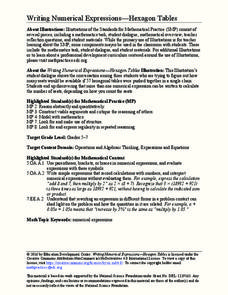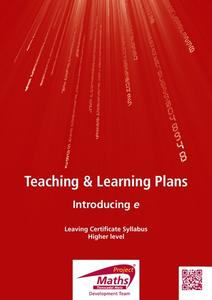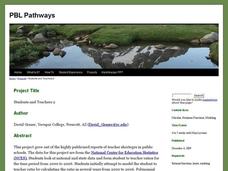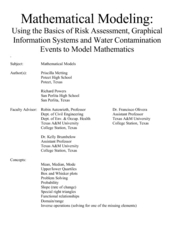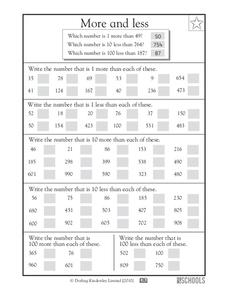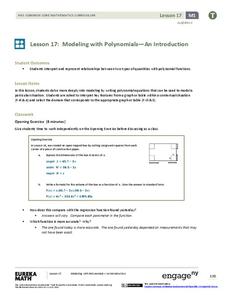Curated OER
Family Quilts Keep us Warm
Students explore families and culture. For this family and culture lesson, students discuss their families and their similarities and differences. Students read the book The Keeping Quilt by Patricia Polacco and create their own quilt...
Annenberg Foundation
Geometry 3D Shapes: Euler's Theorem
How do you get a theorem named after you? Euler knows what it takes! The third lesson of five asks pupils to use an interactive activity to compare the faces, vertices, and edges of seven different three-dimensional solids. They use...
Curated OER
Venn Diagrams, Part 3
Can your first graders interpret Venn diagrams? Different sets of clues help pupils narrow down a specific number in different shapes. They determine odds and evens, greater than or less than, and what shape the number is in. A fun...
Curated OER
Tiles, Blocks, Sapphires & Gold: Designing a Treasure Map
Young cartographers in groups hide treasure at school and then create a map to find it using pattern blocks and tiles. They make paintings with clues to create a visual representation of the location of their treasure. Groups present...
Education Development Center
Writing Numerical Expressions—Hexagon Tables
Explore a basic pattern to practice writing expressions. In collaborative groups, learners examine a contextual pattern and write an expression to model it. The task encourages groups to describe the pattern in multiple ways.
Curated OER
Roman Numeration
Gain a deeper understanding of the base 10 system through practicing conversion to Roman numerals through one million. The class is taught how to read the numerals through modeling and guided practice. This lesson includes a homework...
Curated OER
Patterns of Communication
Scholars examine codes, symbols, and other forms of communication. They discuss Morse Code. Next, they are given messages written in code, which they must decipher.
Curated OER
Missing Numbers to Twenty
Which number is missing? Beginning counters examine twenty-six number sequences, one for each letter of the alphabet. Each sequence has four numbers, ranging from one to 20. There is one number missing from the sequence, and learners...
Los Angeles County Office of Education
Assessment for the California Mathematics Standards Grade 3
Assess scholars' knowledge with a 22-page assessment that covers place value, patterns, probability, estimation, measurement, geometric figures; and their ability to add, subtract, multiply and divide proficiently.
DK Publishing
3 Times Table
This 25-chart will give mathematicians a chance to detect patterns as they shade in every multiple of three by skip counting. They solve multiplication number sentences involving three and the numbers 1-5 (one is done for them.) Finally,...
EngageNY
Algebraic Expressions—The Distributive Property
Do your classes truly understand the distributive property? Use a demonstrative lesson to represent the distributive property in various ways. Learners solidify understanding by creating a geometric pattern for distributive property, and...
Project Maths
Introduction to e
First there was pi and now there's e. A discovery-based lesson helps learners find a pattern in compound interest as the compounding period changes. Their investigation results in the discovery of the number e. The lesson is the first in...
American Statistical Association
What Fits?
The bounce of a golf ball changes the result in golf, mini golf—and a great math activity. Scholars graph the height of golf ball bounces before finding a line of best fit. They analyze their own data and the results of others to better...
Curated OER
Choose the Operation: Plus or minus (up to 100)
Investigate the relationship between addition and subtraction as scholars fill in these number sentences, each of which is missing a symbol. Is it a subtraction or addition equation? There are 20 of these to start, all written...
PBL Pathways
Students and Teachers 2
Examine trends in student-to-teacher ratios over time. Building from the first task in the two-part series, classes now explore the pattern of student-to-teacher ratios using a non-linear function. After trying to connect the pattern to...
02 x 02 Worksheets
Inverse Variation
Discover an inverse variation pattern. A simple lesson plan design allows learners to explore a nonlinear pattern. Scholars analyze a distance, speed, and time relationship through tables and graphs. Eventually, they write an equation to...
Curated OER
Mathematical Modeling
Study various types of mathematical models in this math lesson plan. Learners calculate the slope to determine the risk in a situation described. They respond to a number of questions and analyze their statistical data. Then, they...
Curated OER
Spin a Window!
How many windows does this school bus have? If your class is new to counting, this will be a fun way to get them some practice. Cut out and laminate the spinner template and set it up to spin (instructions written out if you need them)....
Curated OER
More and Less
Mental mathematicians add and subtract 1, 10, and 100 from sets of numbers. Each set of one, two and three-digit numbers gives scholars a chance to practice their addition and subtraction skills. There are 62 whole numbers in all. What...
Curated OER
Populations Lab - Cultures Lesson: Statistics / Sampling Patterns
Ninth graders examine the application of statistical sampling, data collection, analysis, and representation that exists in schooling and teenage lifestyles in Japan and the United States.
Curated OER
Points on a Line
Get your learners up and moving, all while reviewing numbers on the number line! For this activity, learners are grouped in teams outdoors. The teacher will have already created number lines on the ground (with chalk, tape, etc.), and...
Curated OER
Counting by 2s, part 2
Two, four, six, eight...can your scholars count by twos? They fill in missing numbers in 18 number sequences, all of which require skip counting by twos. Some begin on an even number and others odd, however all of these are whole...
EngageNY
Modeling with Polynomials—An Introduction (part 2)
Linear, quadratic, and now cubic functions can model real-life patterns. High schoolers create cubic regression equations to model different scenarios. They then use the regression equations to make predictions.
Curated OER
Indiana Applied Skills Assessment Sample
In this Applied Skills Assessment worksheet, 5th graders complete a sample state assessment for Language Arts and Mathematics for 5th graders. They read a writing prompt and complete a writing activity that follows, answer various types...






